

Hospital doctor: Job description. Hospital doctors examine, diagnose and treat patients who have been referred to the hospital by GPs and other health professionals.

They apply medical knowledge and skills to the diagnosis, prevention and management of disease. Hospital doctors work in wards and outpatient clinics, predominantly in the public sector (National Health Service (NHS)), but also in the private sector. As well as treating patients, they refer them to a wide range of other healthcare professionals including nurses, radiographers, pharmacists and physiotherapists. Hospital doctors work within a number of specialties, of which the most common are: Doctor (hospital): job description. Hospital doctors diagnose and treat medical conditions, disorders, and diseases through the application of specialist medical skills and knowledge.
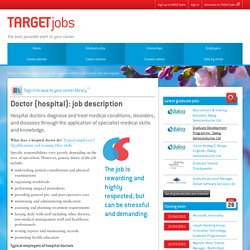
What does a hospital doctor do? Typical employers | Qualifications and training | Key skills Specific responsibilities vary greatly depending on the area of specialism. However, generic duties of the job include: undertaking patient consultations and physical examinations organising workloads performing surgical procedures providing general pre- and post-operative care monitoring and administering medication assessing and planning treatment requirements liaising daily with staff including other doctors, non-medical management staff and healthcare professionals writing reports and maintaining records promoting health education Typical employers of hospital doctors Doctors are employed by the NHS, private sector hospitals, charitable/voluntary organisations and the armed forces.
Hospital doctor. Page Content Hospital doctor Hours48 per weekStarting salary£37,176 + per year.
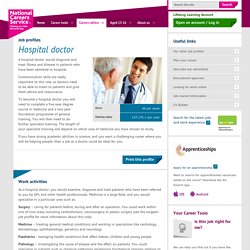
Finance. Specialisms. HealthSocialCare Medicine. Getting into Medicine: Top tips for Medicine applicants on interviews. So you’ve been offered an interview, your UCAS form must have impressed!

Our Careers Consultant Jean Harris gives her top tips on how to ace an interview for Medicine! Congratulations on getting an interview. The university is interested in having you as a student. The interviewers genuinely want you to show why they should give you a place. The interview is not designed to trick you or intimidate you. Before the day Check out the information from the university course you’re being interviewed for. On the day Admissions tutors are looking for enthusiasm, commitment and skills such as empathy, social awareness, communication and clear thought processes such as the ability to weigh up an issue. How to become a doctor. Please note: Our how to become a doctor guide is under review and has not been updated for 2015.
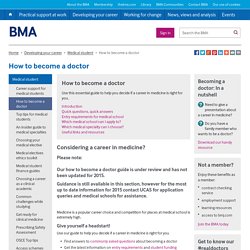
Guidance is still available in this section, however for the most up to date information for 2015 contact UCAS for application queries and medical schools for assistance. Medicine is a popular career choice and competition for places at medical school is extremely high. Give yourself a headstart! C1 BecomingadoctorBMA. C1 GraduateEntrytoMedicineFacts. Graduate Entry Medicine - a guide - The Student Room. Standard Medical Courses (5 or 6 years) - Medschools Online Medschools Online. Gamsat. Situational Judgement : UKCAT. The information below relates to the 2016 UKCAT and the 2017 UKCAT (Humanitas University).
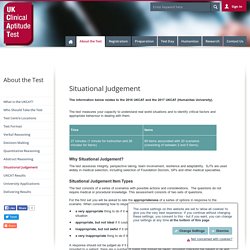
The test measures your capacity to understand real world situations and to identify critical factors and appropriate behaviour in dealing with them. Why Situational Judgement? The test assesses integrity, perspective taking, team involvement, resilience and adaptability. SJTs are used widely in medical selection, including selection of Foundation Doctors, GPs and other medical specialties. Situational Judgement Item Types The test consists of a series of scenarios with possible actions and considerations. The Foundation Programme - SJT/EPM. Situational Judgement Test (SJT) The SJT replaces the previous ‘white space’ application form questions as a measure of meeting the national person specification.
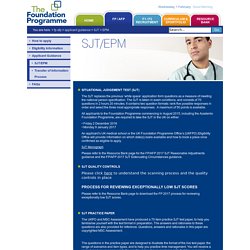
The SJT is taken in exam conditions, and consists of 70 questions in 2 hours 20 minutes. It contains two question formats: rank five possible responses in order and select the three most appropriate responses. A maximum of 50 points is available. All applicants to the Foundation Programme commencing in August 2015, including the Academic Foundation Programme, are required to take the SJT in the UK on either: • Friday 2 December 2016• Monday 9 January 2017. C1 Medicineapplications. C1 toptipsmedicineappl. Medical Curriculum Vitae. How do I go about writing my medical CV (curriculum vitae)?
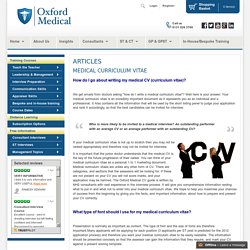
CEP_MedicalCVsandApplications. C1 personalstatement. Medicine Personal Statement Examples. Medicine personal statement. From an early age I have been fascinated by the workings of life.
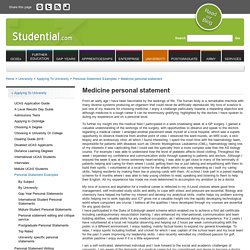
The human body is a remarkable machine with many diverse systems producing an organism that could never be artificially reproduced. My love of science is just one of my reasons for choosing medicine. I enjoy a challenge particularly towards a rewarding objective and although medicine is a tough career it can be enormously gratifying, highlighted by the doctors I have spoken to during my experience and on a personal level. To further my insight into the medical field I participated in a work shadowing week at a GP surgery. I gained a valuable understanding of the workings of the surgery, with opportunities to observe and speak to the doctors regarding a medical career. Personal Statement Examples Medschools Online. Medical School Interview Questions. Leeds University Library /All Locations.
Journal of the left-handed biochemist. The following are notes written for a session I was asked to run with sixth form students about preparing for Med School interviews.
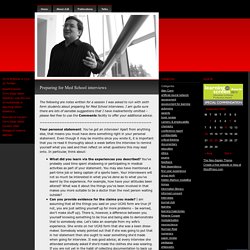
I am quite sure there are lots of sensible suggestions that I have inadvertently omitted – please feel free to use the Comments facility to offer your additional advice. Your personal statement: You’ve got an interview! Apart from anything else, that means you must have done something right in your personal statement. Even though it may be months since you wrote it, it is important that you re-read it thoroughly about a week before the interview to remind yourself what you said and then reflect on what questions this may lead onto. Multiple Mini Interview: How to Ace the MMI. Information on UEA Interviews. University of Leeds Careers Centre Blog. Being rejected is hard to take, and whilst it may feel like the end of the world at the moment, be reassured it isn’t. If you’ve found yourself in this situation and aren’t sure what to do next, read on as our Careers Consultant, Jean Harris, gives her advice on how to pick yourself up and start over.
Firstly, if your disappointment is preventing you from moving on and from considering your options, remember you can access help to deal with your feelings at the University’s Counselling Service. The Foundation Programme - Homepage. The Foundation Programme - Medical students. The Foundation Programme - Foundation Doctors. C1 planningyourmedicalcareer. C1 MCAN AcademicFoundationProg. The Foundation Programme - Academic Programmes. Health Careers. Gaining experience. This page describes the various ways you can gain the experience you need to prepare you for a career in health. It explains the benefits of gaining experience, how you can make the most of it and how to go about finding opportunities.
Study Medicine Abroad. Updated 30th March 2015. Will my degree be recognised? This is a highly important consideration when choosing to study medicine abroad. We cannot guarantee the accuracy of any information that we give you in this respect and so would advise you to check with General Medical Council about the suitability of any particular university's medicine qualifications. However, we can confirm that there are many medical schools around the world that specialise in teaching international students. Many of these universities' graduates are working in the UK healthcare sector although often they may have amassed considerable experience abroad in addition to their studies. All qualifications taught within the European Union should be judged as equal but it is worth checking with the GMC as they will know more about the relative quality of medical qualifications than we or an education agent can.
Does it make sense to study medicine abroad? Yes, but... Information for doctors. Medical Women's Federation Home Page. Get into Medical School with UKCAT, BMAT & Interview Courses. Medschoolsonline - A Guide to Getting into Medical School in the UK. Consultant Interviews, Teaching and Management courses. Protecting sight and fighting for disability rights. Student BMJ: The International Medical Journal for Students. : UKCAT. Workexpteachersguide-final- A- Z List of All NHS Acute (Hospital) Trusts in England. Comprehensive Advice on Working in Health. Guide for Prospective Medical Volunteers. Find services. Provider of national guidance and advice to improve health and social care. Skills for Health - Home. World Directory of Medical Schools. A global health and human rights organization. We Are WAMS. World Health Organization.